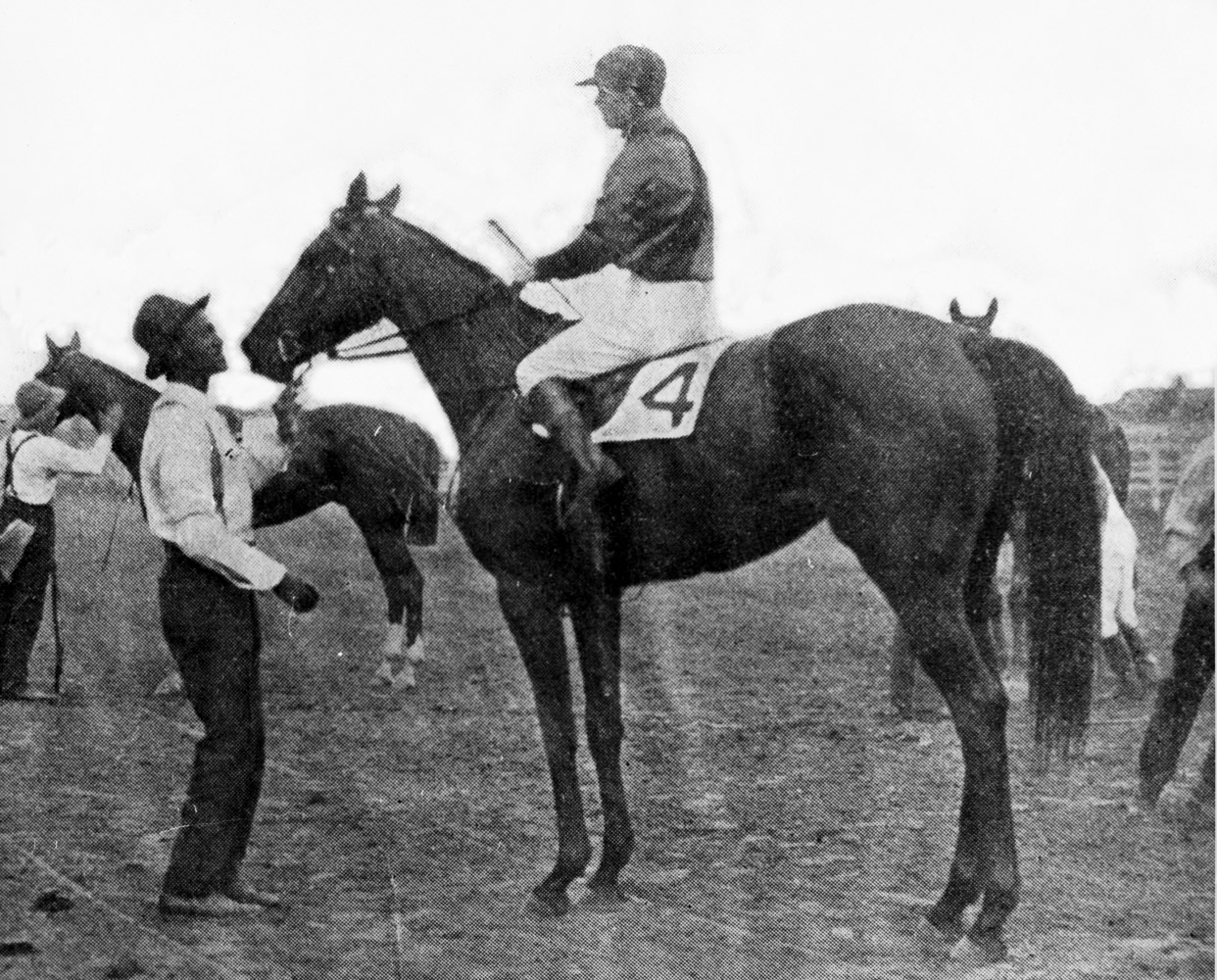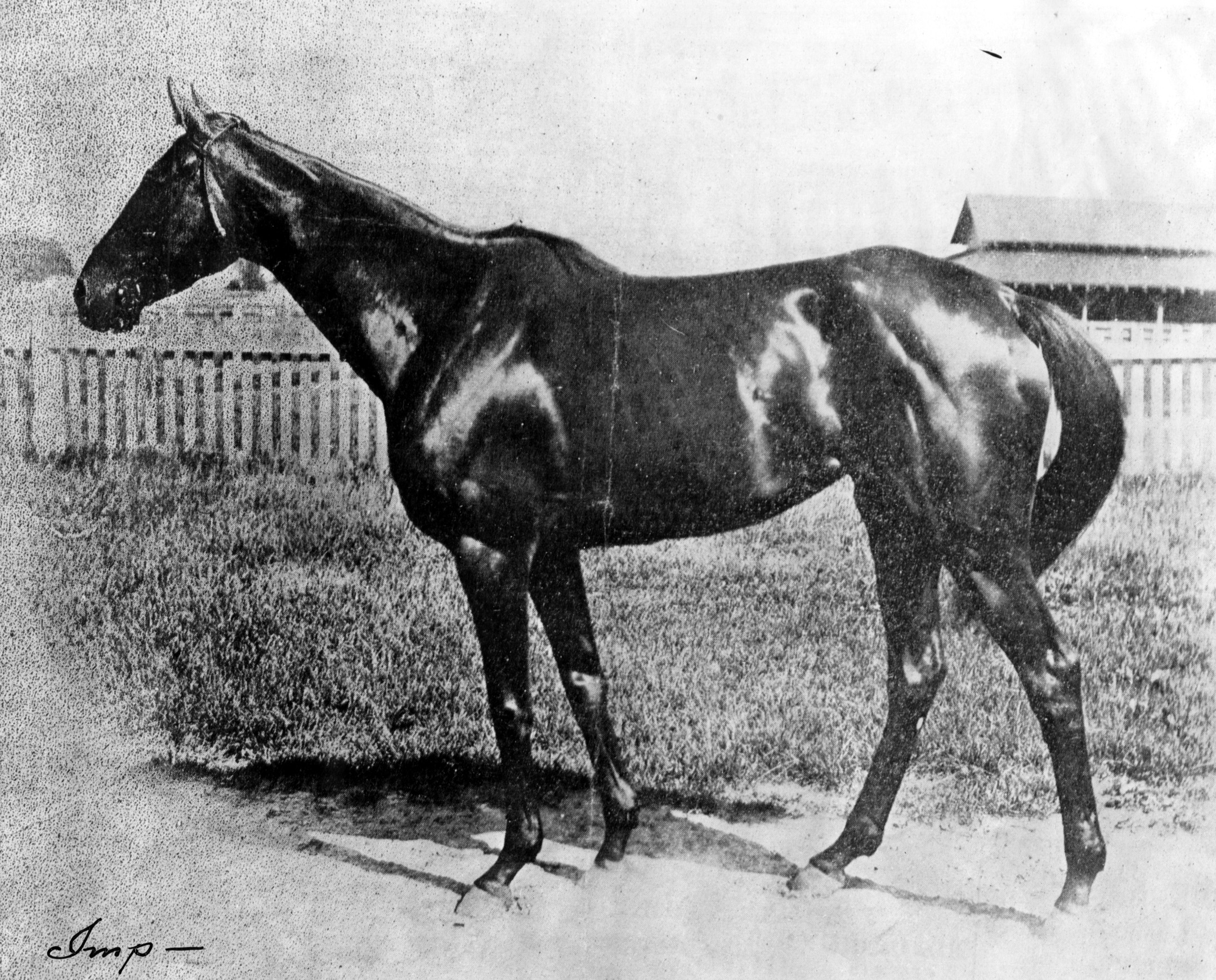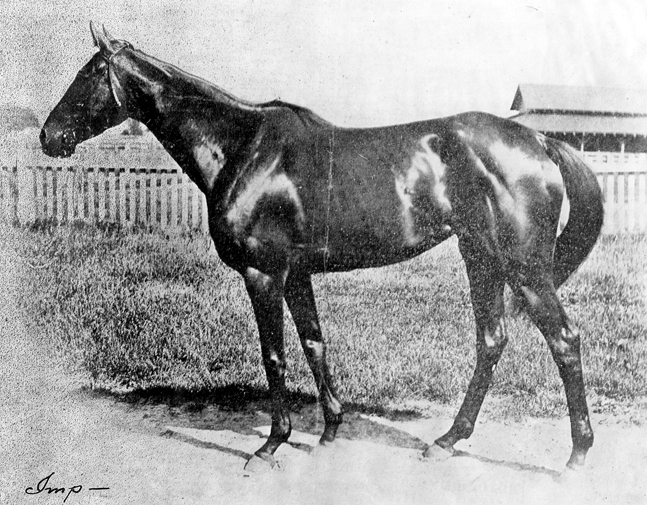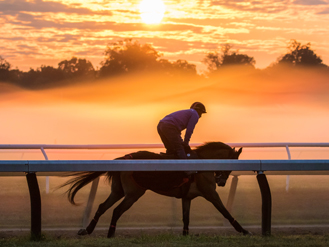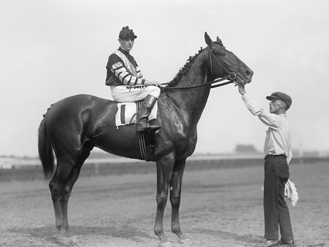Imp (OH)
Nicknamed “My Coal Black Lady” after a popular song of the era, Ohio-bred Imp won 62 races in her six years on the turf and earned lasting fame as the first mare to win the Suburban Handicap.
Racing Record
171
Starts
| 1896 | 11 | 3 | 4 | 2 | $1310 $1,310 |
| 1897 | 50 | 14 | 10 | 9 | $4934 $4,934 |
| 1898 | 35 | 21 | 6 | 3 | $12340 $12,340 |
| 1899 | 31 | 13 | 3 | 5 | $30735 $30,735 |
| 1900 | 31 | 8 | 10 | 9 | $18185 $18,185 |
| 1901 | 13 | 3 | 2 | 1 | $2565 $2,565 |
Biography
Nicknamed “My Coal Black Lady” after a popular song of the era, Ohio-bred Imp won 62 races in her six years on the turf and earned lasting fame as the first mare to win the Suburban Handicap.
Bred by Dan Harness at High Bank Farm near Chillicothe, Ohio, Imp was a black daughter of Wagner out of the Fonso mare Fondling. Turned over to trainer Charley Brossman, Imp made her debut on May 22, 1896, at the old Oakley course near Cincinnati, Ohio. Imp broke her maiden that day and started a total of 11 times as a 2-year-old between Oakley and Latonia in Kentucky. She won two other purses and finished second four times in a nondescript campaign.
As a 3-year-old, Imp raced frequently, starting an incredible 50 times in 1897. Imp enjoyed some success against the modest company, posting a record of 14-10-9, but her earnings of $4,934 were paltry considering the workload.
Brossman believed Imp thrived because of the constant racing.
“She has a prodigious appetite, eats 12 quarts of oats at a feed and like most great racers is a glutton at her food as in her work,” Brossman said. “She can stand more hard galloping than any racehorse in training and improves over it. She has got to be raced and worked continually. She likes it, it is good for her, and she races better for it.”
At 4, Imp began by winning 10 of 11 starts, which prompted Brossman to seek out some better competition and bigger prizes. In her first start in New York, Imp won $800 at Gravesend on June 13, 1898, and had created some buzz with her 11th victory in 12 starts. In her first true test against top competition, however, Imp finished sixth in that year’s Suburban Handicap, won by Ornament. Imp finished sixth in her next start at Gravesend and Brossman took her back to the Midwest, where she won a couple $600 purses before losing seven in a row in overnight events.
Imp began to find her form again that September, winning her first stakes race, the $1,000-added Monadnock Stakes. She then added wins in the $1,000-added Austin Selling Stakes, the six-furlong Speed Stakes, and seven-furlong Dash Stakes. Imp concluded her 4-year-old season with a record of 21-6-3 from 35 starts and earnings of $12,340.
At the age of 5 in 1899, Imp enjoyed her finest campaign. It took some time, however. Returning to New York, Imp finished fourth in the Metropolitan Handicap, eighth in the Toboggan Handicap, second in the New Rochelle Handicap, and third in the Claremont Highweight Handicap before earning her first New York victory in a nine-furlong overnight handicap at Morris Park. Imp then finished a dismal 15th in the Brooklyn Handicap, which was her eighth start in only three weeks.
A bit of a rest did wonders for Imp. Given two weeks off, she returned to win a pair of races leading up to her second crack at the Suburban Handicap, which carried a purse of $10,000. Under Hall of Fame jockey Nash Turner, Imp settled behind the early pace and took command after six furlongs to win by two lengths with Bannockburn second. She became the first mare to win the Suburban in the process.
Imp then finished second in the Coney Island Handicap and third in the Long Island Handicap before contesting the Brighton Handicap. Giving nine pounds to Lawrence Realization winner Ethelbert, Imp took command early and won by a length in track-record time. The winning share was $8,420, the biggest purse she ever won. Imp then added wins in the Islip Stakes, Ocean Handicap, Turf Handicap, First Special, Second Special, and Oriental Handicap. In the 1½-mile Second Special, Imp lowered the Gravesend record for the distance by 1½ seconds to 2:34 flat.
Imp finished her 5-year-old campaign with a record of 13-3-5 from 31 starts and earnings of $30,735, including wins in eight New York stakes and two track records. She had come a long way from her humble beginnings in Chillicothe, Ohio.
Popular with fans and the newspapers, the New York Tribune said of Imp, “What is the toughest of metals? Imp is made of it and she is a popular idol on the turf.”
At 6, Imp set a track record at Gravesend in winning the Parkway Handicap. Her biggest win of the year, however, took place in the 1¾-mile Advance Stakes. Imp won by an estimated 30 lengths in 2:59⅕, two seconds faster than the Sheepshead Bay record for the distance and a new American record (previously 2:59¼ by Ben Holladay). Imp earned her final stakes victory on Oct. 25, 1900, at Empire City in the Mahopac Handicap. She compiled a record of 8-10-9 from 31 starts in 1900 with earnings of $18,185.
Harness severed his relationship with Brossman in 1901 and brought back Imp for a final campaign at age 7 with trainer Peter Wimmer. Imp won two overnight races at Saratoga, one at Morris Park, and finished third in the Saratoga Cup. She ran for the 171st and final time of her career on Nov. 9, 1901, at Aqueduct, finishing sixth.
Following Harness’ death in 1902, Imp was sold for $6,000 to John E. Madden. At Madden’s famed Hamburg Place, Imp produced five foals, including stakes winner Faust. Imp died in 1909 at age 15.
Achievements
Horse of the Year — 1899
Champion Handicap Female — 1899
Champion Handicap Female — 1900
Media
